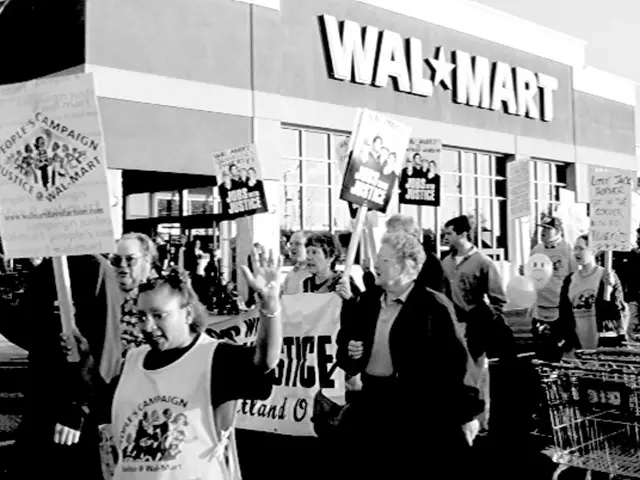Evolution of Electronic Voting Surveys in Politics
What the Heck's Happening with Political Polling in the U.S.?
Let's be real, every election season in America, folks were used to checking out FiveThirtyEight to get a sense of where things are headed. But lately, things ain't looking so rosy. Polls, once a staple of American democracy, providing snapshots of public sentiment, shaping political strategies, and fueling media narratives, now feel more like a shell game gone wrong. With the mess of the 2024 presidential election, the reliability and credibility of these polls are under the microscope like never before. So, where the hell is political polling headed in the States, and will cutting-edge tech ride to the rescue or will the credibility crumble further?
Polling's Cryin' for Help
One major struggle facing political polling is folks' dwindling trust in its accuracy. High-profile misses in 2016, 2020, and 2024 that vastly underestimated support for Donald Trump have left many Americans shaking their heads and questioning the validity of these polls to predict election outcomes reliably. This distrust is amplified by broader societal trends - declining faith in media institutions, the deluge of misinformation, and the insular thought bubbles spun by social media platforms.
Trust Issues
This lack of faith has some significant implications. As trust decreases, so too does civic engagement. Polling relies on a representative sample of the electorate, but response rates have tanked from nearly 36% in the 1990s to pitiful single digits today. Result? The pollsters have a harder time capturing an accurate cross-section of the American electorate, leaving the door open for potential biases in their findings.
Demographic Shifts
The American electorate is getting more diverse - with Latino, Asian American, and young voters playing increasingly significant roles in elections. Traditional polling methods often struggle to pick these demographic groups up, especially those who are less likely to respond to surveys or speak languages other than English. To tackle this electorate in flux, innovative strategies that shuck traditional methodologies are needed.
Partisan Dragon
Partisan polarization also tugs at the accuracy of polling. A phenomenon called "nonresponse bias" - where certain groups are more likely to ignore pollsters - has posed challenges in capturing support for particular candidates. For example, some Trump supporters have called the polling stations biased and distrusted the media, potentially leading to their underrepresentation in surveys. If pollsters don't fix this bias, their predictions will continue to fall flat.
Tech Revolution
Technology has flipped the polling game upside down, with pros and cons. Traditional phone surveys were the kings of the scene for decades, but the rise of cell phones and caller ID has made it trickier to reach respondents. Today, pollsters today lean on online surveys, social media sentiment analysis, and even AI to gauge public opinion.
Online polling boasts advantages - it's quicker, cheaper, and can reach a broader demographic - but it ain't without flaws. Internet surveys rely on voluntary participation, which can skew results if certain groups opt-out at higher rates. Additionally, social media analytics, while promising, sometimes strictly represent the vocal users rather than a representative electorate. To sum it up, while digital tools offer exciting new possibilities, they need careful tweaking to ensure accuracy.
Artificial intelligence is a budding frontier in political polling. AI-driven models analyze big bursts of data to detect patterns and predict election outcomes. By blending diverse data sources, like online behavior, economic indicators, and voter registration trends, AI may help satiate the declining response rates. But AI also poses ethical woes. The opaque nature of machine learning algorithms raises worries about bias and manipulation, particularly in this era of deep political distrust.
Beyond standard surveys, campaigns, and political analysts are banking more on big data and predictive modeling to predict election outcomes. Voter files, consumer data, and behavioral analytics offer insights that go further than self-reported polling responses. Analysts ain't asking voters about who they back, but instead predict preferences based on past behavior, social networks, and even shopping habits.
But collecting and using personal data for political purposes toe the ethical line, especially when voters are clueless about how their info is used. As we step forward, political polling needs to walk a tightrope – embracing innovation while staying responsible about privacy and ethics.
Pollster's New Dance
Given the challenges facing traditional polling, the future is likely a hybrid approach that uses multiple methodologies. A mix of online surveys, live phone interviews, text messaging, and AI-powered analytics may help offset the weaknesses of any single method. Additionally, pollsters need to stand up taller and put their cards on the table – explaining their methods, acknowledging limitations, and communicating uncertainty effectively to the public.
Political campaigns, media outlets, and policymakers must also readjust their reliance on polling. Instead of treating these polls as infallible prophets, they need to be viewed as tools that capture trends and shifts in public opinion rather than absolute outcomes. The future of political polling in America ain't doomed - if the industry can adapt to tech advancements, rebuild public trust, and embrace methodological innovation; it'll continue serving as a priceless instrument in understanding the American electorate. Yet if it fails to evolve, polling risks sliding into obsolete history – an artifact of a time when trust in institutions was stronger, and measuring public sentiment was an easier task. The influence of prominent figures like President Trump and tech maverick Elon Musk has shaken up the polling landscape, requiring pollsters to dance a delicate dance to maintain accuracy and trust.
Musk & Trump's Impact
Trump's Trump Card
Trump's administration and dramatic policies have heightened political polarization in the United States. His supporters and detractors often foster strong sentiments, leading to response biases or reluctance to take part in polls. In this fraught atmosphere, pollsters need to develop strategies to account for potential nonresponse bias and ensure their samples represent the diverse political landscape.
Musk's DOGE Master Plan
Musk's leadership of the Department of Government Efficiency (DOGE) comes with hefty implications for political polling. His approach centered on technological solutions and data-driven decision-making could boost pollsters' adoption of advanced analytics and AI to improve predictive accuracy. However, his methods can also trigger debates about privacy and ethical use of personal data, as his techniques involve massive data collection and analysis, raising concerns about potential overreach and protection of private info.
In conclusion, whether we like it or not, political polling ain't what it used to be. The landscape is a maze full of tech advancements, political polarization, influencers like Elon Musk and Donald Trump, and the public's dwindling trust in institutions. Yet, there's hope. By adapting to technology, committing to inclusiveness, embracing ethical rigor, and valuing transparency, pollsters can charge forward in this new frontier, shaping the future of political polling and serving democracy for years to come. The road ahead might be tricky, but heck, if pollsters can rise to the challenge, there's no stopping them.
- As the distrust in political polling persists amidst high-profile inaccuracies and declining response rates, the public's preference for news and opinion sources is shifting, potentially affecting the role of polls in shaping media narratives and political strategies.
- The growing diversity of the American electorate and the difficulty in capturing less accessible demographic groups, such as non-English speakers and younger voters, are challenges the polling industry must address to maintain credibility and provide accurate snapshots of public sentiment.
- The advancement of technology in political polling opens doors to new possibilities, but the opaque nature of artificial intelligence and potential bias pose ethical concerns, necessitating careful consideration and transparency.
- Across the spectrum of general news, crime and justice, entertainment, social media, technology, education and self-development, policy and legislation, and war and conflicts, the influences of figures like Donald Trump and Elon Musk add complex layers to the polling landscape, requiring pollsters to adapt and make thoughtful adjustments to their methodologies.
- With the advent of technology and its application in political polling, the privacy and ethical use of personal data become increasingly important concerns for policymakers, the public, and the polling industry alike.
- In this ever-evolving landscape of political polling, adaptability is key to maintaining accuracy and trust while incorporating technological advancements, addressing concerns about bias, and advocating for transparency and ethical integrity.








